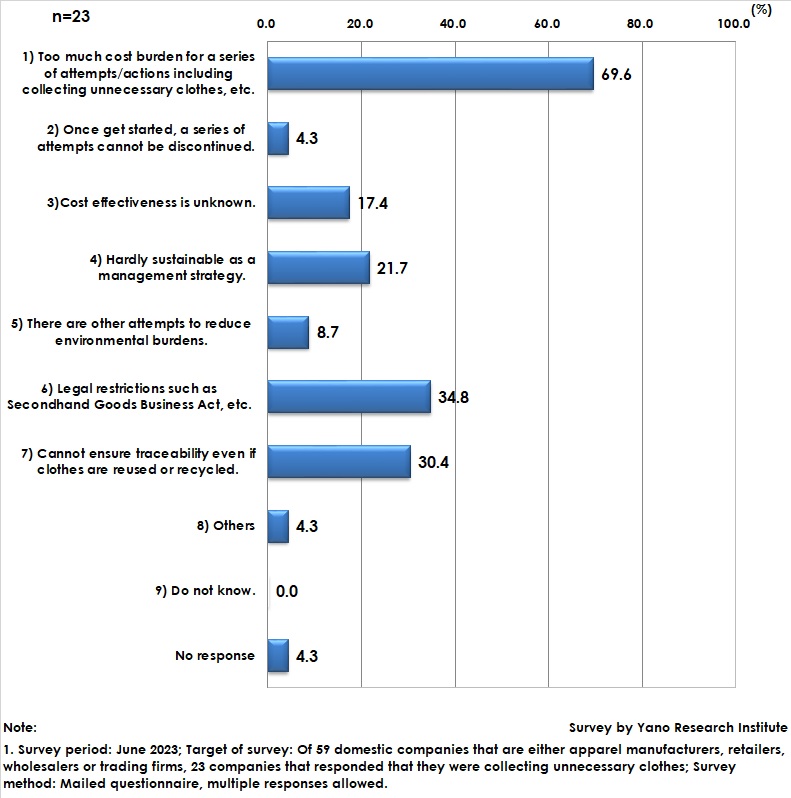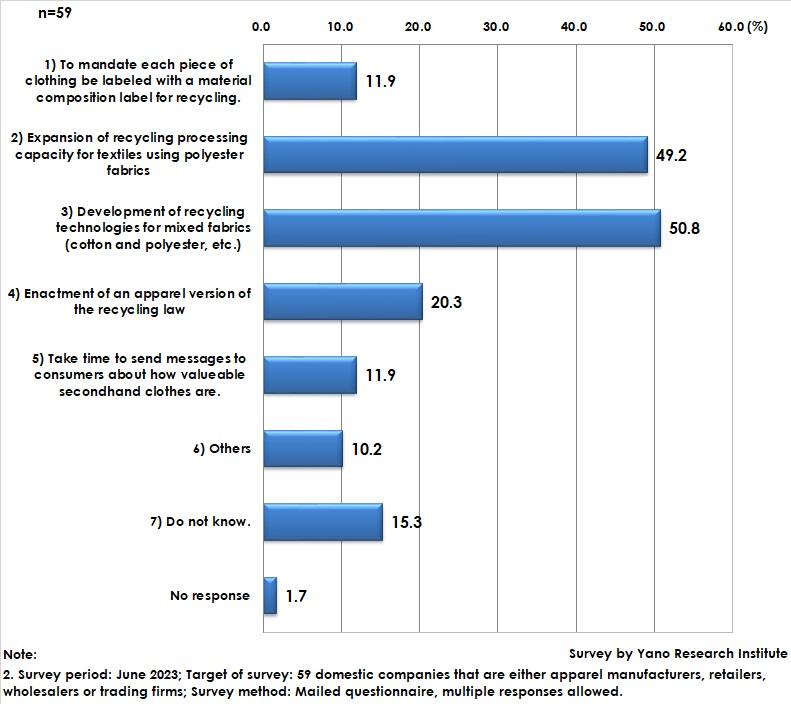No.3363
Questionnaire on Circular Fashion Promotions 2023
Stranded Efforts to Collect, Reuse and Recycle Unneeded Clothes at Apparel Stores Stem from Cost Burden
Yano Research Institute (the President, Takashi Mizukoshi) has conducted a questionnaire to corporations on the current statuses and challenges for collecting, reusing, and recycling unneeded clothes. Here discloses a part of the analysis from the survey results.


Summary of Research Findings
The questionnaire has been conducted in June 2023 to total 59 companies in Japan that are either apparel manufacturers, retailers, wholesalers or trading firms on the current statuses and challenges in collecting, reusing, or recycling (resource recovery) of no-longer-needed clothes at stores promoted by the apparel industry, and on prerequisites for promoting such circular fashion efforts.
An increasing number of companies in the apparel industry has started collecting unneeded clothes from consumers and citizens as an effort to contribute to environmental preservation, due to higher attention to the sustainable society. To the question whether collecting unneeded clothes at stores (single response allowed), 40% responded that they were and the rest of 60% were not. While those that collect unnecessary clothes were less than half of the companies surveyed, when observing them by company, the efforts have been addressed mainly by apparel manufacturers.
Of those 23 companies collecting unneeded clothes, their challenges (multiple responses) for expanding reuse and recycling of clothes were “Too much cost burden for a series of attempts/actions including collecting unnecessary clothes, etc. (69.6%),” “Regulations such as Secondhand Goods Business Act (34.8%),” “Cannot ensure traceability even if clothes are reused or recycled (30.4%)” and more.
When asked about the requisites for recycling of clothing (multiple responses), “Development of recycling technologies for mixed fabrics (cotton and polyester, etc.) (50.8%)” and “Expansion of recycling processing capacity for textiles using polyester fabrics (49.2%)” were shown as especially important by 59 companies surveyed.
Noteworthy Topics
Cost Burden Kept Efforts of Collecting, Reusing, and Recycling Unneeded Clothes from Expanding
In the survey, approximately 70% of companies indicated the cost burden to be one of the reasons for not being able to expand collection, reuse, and recycle of clothes waste in the apparel market. For instance, if an apparel company that has not yet built any system of its own to reuse or recycle clothing waste, it needs to collaborate with an external textile recycler that collects, sorts, and recycle (resource recovery of) waste textiles. In addition, if the apparel company transfers the collected waste clothes to a textile recycler, it will be difficult to ensure traceability, which means that it will be difficult to confirm how far the clothes are reused or recycled.
There also is a challenge of legal restrictions such as Secondhand Goods Business Act, etc. at the phase of collecting unnecessary clothes, because the Act requires an identity verification of the consumer or citizen (the supplier of clothes no longer needed) when the apparel company gives a benefit in exchange of the waste clothes offered. Because store staff mainly work for customer service and for selling products, other tasks will become a burden.
Technological development and expansion of capacity are other challenges. The survey results have indicated that the technological development for recycling blended fabrics (cotton and polyester, etc.) and expansion of recycling processing capacity for clothing made of polyester fabrics are pointed out as especially important.
Many of clothing and other textiles available in Japan are not made only from single material such as 100% cotton or 100% polyester, but mixed fabrics composed of two or three types of materials. In such a situation, it is also pointed out that Japan has not yet developed the technologies to recycle textiles made of blended fabrics.
Furthermore, because only a few companies in Japan have commercialized chemical recycling of polyester materials (i.e., chemical treatment and recycling back to raw materials before reuse), there is not enough capacity for recycling processing. This owes to the necessity of large-scale investment including capital investment to build a plant for chemical recycling of polyester fabrics. It seems to be because companies will have risks to spend vast amount of upfront investment while consumer demand for apparel products (clothing) using recycled materials is unpredictable.
Research Outline
2.Research Object: Total 59 companies that are apparel manufacturers, retailers, wholesalers or trading firms in Japan
3.Research Methogology: Mailed questionnaire
Questionnaire to Companies on Challenges for Promoting Circular Fashion Attempts
The questionnaire has been conducted in June 2023 to total 59 domestic companies that are either apparel manufacturers, retailers, wholesalers or trading firms on the current statuses and challenges in collecting, reusing, or recycling (resource recovery) of unneeded clothes at stores promoted by the apparel industry. We surveyed and analyzed the hindrance and challenges for promoting and spreading circular fashion. Here discloses a part of the survey results.
Published Report
Contact Us
The copyright and all other rights pertaining to this report belong to Yano Research Institute.
Please contact our PR team when quoting the report contents for the purpose other than media coverage.
Depending on the purpose of using our report, we may ask you to present your sentences for confirmation beforehand.